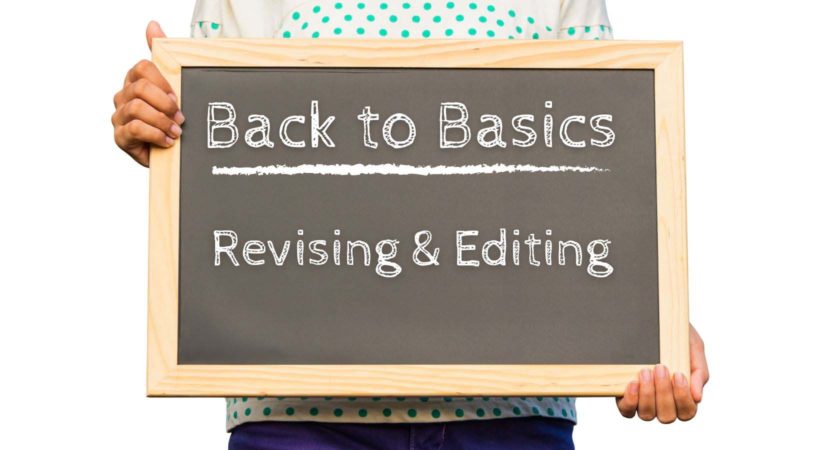
Back to Basics: Revising & Editing
Welcome to our Back to Basics series! In this series we explore some of the foundational methods, practices and terminology for teaching reading and writing. This series is for those new to the field of literacy, beginning tutors or those who would just like a refresher. This week we discuss revising and editing text.
Revising and editing are important post-writing activities. Many believe revising and editing are the same process. However, revising clarifies and alters the structure of the text. Its intention is to make the writing more clear, concise and accurate. Editing is the process of fixing the mechanical errors in the text.
Revision
“The process of looking again at a draft to ask, ‘Does this writing clearly say what I want it to say, and, if it does not, what changes do I need to make?’ Revision is centered on audience and purpose, idea development, organization, structure, and language choice. It is not editing.” – Just write! guide
Reading Rockets makes the following recommendations when teaching the revision process:
- Explain the revising process explicitly. Provide specific, meaningful goals for the revision and/or clearly identify the audience.
- Model the strategy with think-alouds. This can be achieved by displaying one writing sample on a flipchart or screen and using that sample to model and discuss how to revise the draft in a way that would improve it.
- Provide guided practice with feedback. This can be done through peer editing in a group setting and/or through meaningful tutor-learner dialogue. These collaborative efforts reinforce the understanding that writing is a social process in which a message is created for an audience.
- Gradually work toward independent mastery by learners.
Editing
Once the learner has completed the revision process, they can move on to editing. Editing includes checking for errors in spelling, capitalization, punctuation and grammar. Many learners with low literacy will need help identifying the errors and learning how to correct them. One method uses the acronym COPS:
- Capitalization
- Overall Appearance (or sometimes Oral reading)
- Punctuation
- Spelling
The “O” in the acronym can mean two different activities. If interpreted as “oral reading,” this means the learner reads their composition aloud or has someone else read it to them. “Overall appearance” can include the learner asking the following questions:
- Is my handwriting spaced right and legible?
- Is my paper neat? (Without smudges, not crumpled or ripped)
- Have I indented and kept straight margins?
- Have I used complete sentences?
- If I’m unsure of something, have I asked someone for help?
Both interpretations of the “O” in COPS are important to use. With each letter of the acronym, specific editing strategies should be modeled for the learner until they are confident to try themselves.
“After selecting a particular COPS editing format, ask the students to begin by proofreading their work and then asking for help. Students will highlight, circle or underline mistakes involving spelling, capital letters, punctuation, language use, etc.” – Nicole Lauzon
There are many other acronyms that encompass the editing phase of writing. Choose the one that works best for your learners’ needs.
Revising and editing writing can be challenging for learners. By using direct, explicit and systematic instruction, learners will practice writing in a supportive environment and will experience more success.
Resources
- The COPS Editing Strategy
- Just write! guide
- Revision (adaptable for adults)
- Teaching Writing or Editing Writing? (adaptable for adults)
- Writing Lesson Idea: Self-Editing
- Writing: Reviewing and Editing
- The writing revolution : a guide to advancing thinking through writing in all subjects and grades (chapter 5)
A note to readers: The Back to Basics series will be coming to a close at the end of June 2022. Thank you for making this series such a success! We hope you have enjoyed reading these posts as much as we have enjoyed writing them. Decoda blog posts will continue to be published twice weekly.
Related Blog Posts
Reading Skills vs. Strategies
What is the difference between a reading strategy and a reading skill?
The Benefits of Using Video in Literacy Tutoring
Learn about the benefits of using video in your literacy teaching.
Virtual Tutor Training Resources
Decoda is pleased to introduce the new adult literacy virtual tutor training resources!
